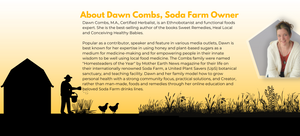Bees First!
At Soda Farm our primary focus in beekeeping is the health of our bees, and we are a Bee Friendly Certified Farm. Much like our farming practices, we strongly believe that the honeycomb is the “soil” of the hive, and we work to minimize external impacts on our bees that can compromise their health.
You can read more about our practices in depth in Dawn's book Sweet Remedies: Healing Herbal Honeys (Storey, 2019) affiliate link.
Our Beekeeping Practices
Our sustainable philosophy in beekeeping means:
No HFCS or Sugar Water
Giving bees sugar water or high fructose corn syrup is like feeding them a diet of junk food. We believe that your food is your medicine and health is directly tied to the food that we eat. When it’s a choice between having more honey to sell or having enough honey to feed our bees…it’s a simple choice. Healthy and happy bees are more productive. Healthy hives that survive longer provide long term benefits for everyone on the farm
No Chemicals or Unnatural Substances
We see the bee colony holistically as a complete organism. Any parasite or disease is the result of a loss of robust health of the bee and/or the comb in which they live. The underlying cause of this loss must be dealt with rather than merely addressing symptoms. As beekeepers we strive to remove as many stressors as we can control in order to allow the bees to adapt to or address those we cannot impact. There are many different practices that we employ to naturally protect our hives. The most important of these are the following:
- Herbal plantings and proprietary herbal blends for the hive
- Proper wind screening and winter insulation
- Allowing our bees to build foundation-less comb in the brood chamber
- Beeswax foundation in the honey supers and NO plastic frames
- Minimal disturbance of the brood chamber
- Minimal use of smoke to limit impact on honeycomb
- Placing hives near natural pollen and nectar sources to minimize contact with agriculture
- Preservation of nearby symbiotic insect colonies for the health of the hive
No Package Bees
Our inspector considers our hives to be “feral” colonies. It is not our practice to re-queen or to prevent swarming to increase harvests. We believe that swarming is the natural order of a strong colony to expand and keep balance in the existing hive. Local hives that swarm can withstand the ups and downs of Ohio weather. Packages of bees from Georgia and Florida have proven to be unreliable, unhealthy and harder to maintain in our climate. We let our hives swarm and also collect swarms from the community as a helpful way to increase our bee population.
Harvesting Once Per Season
As a superfoods farm, we want our customers to get the greatest benefit out of everything we produce. Our honeys are raw and never cooked. We also harvest late into the season to ensure that the resulting honey incorporates everything that blooms from spring through fall. This means the greatest allergy benefit all in one jar. We go so far as to not use heated knives when extracting to ensure that the goodness of honey is not lost. We're not only concerned about our health, but the health of the bee. Our little workers collect pollen and nectar from all sorts of plants to store in the hive. Bees know best and collect the nutrition that they need...much like a cow or goat will seek out the very plants that will give them needed nutrition at any point in time. While some beekeepers collect varietals or seasonal honey, we know that good health is worth waiting for. Our late harvest and feeding methods provide the ability for our bees to stockpile a well-balanced stockpile of honey in the hive as they prepare for winter. If supplies fall short in the hive during the spring or fall, we feed back their own honey.
Just Getting Out of the Way
Like all things in nature, we know that there are lots of things that we just don't understand. Our philosophy is that bees know a lot more about how to be bees that we stupid humans. With that in mind, we try to minimize our impact on the hives and limit our interaction. The less we interfere, the fewer mistakes and repairs that the bees must overcome....instead of making honey!
